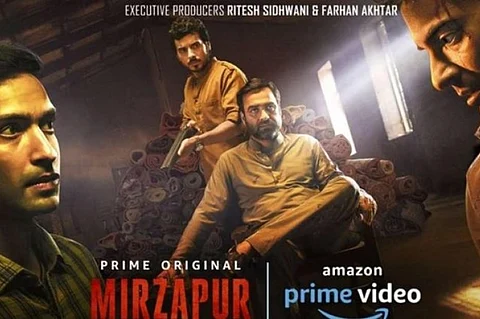

The name 'Mirzapur' traces its etymology back to the Persian words Emir (commander ) and Zad ( lineage) and literally translates to ‘place of a king’. It’s an apt title for Amazon Prime’s third made-in-India original, produced by Excel Media and Entertainment, that tells the story of a powerful overlord trying to rule his fiefdom while consolidating control for his heir apparent.
Directed by Karan Anshuman, Mihir Desai, and Gurmmeet Singh, Mirzapur boasts of an enviable ensemble cast and a story that on paper, has all the ingredients for another small town crime potboiler. It’s an interesting ‘othering’ of small town India as a hotbed of crime and all things immoral and rather perversely exotic, for a largely urban audience watching it on a digital platform. The self-styled king of Mirzapur is Akhandanand Tripathi (Pankaj Tripathi), whose business of manufacturing carpets has earned him the name Kaleen Bhaiyaa (kaleen is carpets, bhaiyya is brother). However, brushed literally and otherwise under and into these rugs, is an empire of drugs and weapons trade that has made him a millionaire and earned him the fear and following of the town.
But even the most powerful dons have their problems, and Akhandanand’s not-so-prodigal son Munna (Divyenndu) threatens to be his downfall. High on a cocktail of drugs and a sense of entitlement, Munna joins a wedding procession and accidentally shoots the groom dead. Ramakant Pandit (Rajesh Tailang), an upstanding lawyer, takes up the case against Munna, only to inadvertently have his sons Guddu (Ali Fazal) and Bablu (Vikrant Massey) get involved in the very world he abhors.
While Tripathi ropes the boys in a bid to save his son and use their combined strengths of brawn and brain to advance his empire, Munna feels slighted and seeks payback. What follows is a downward spiral into darkness and death, as Guddu and Bablu battle to survive a complex web of greed, power and ambition.
While the story is a work of fiction, Mirzapur is, in fact, a real town known for its carpets in Uttar Pradesh. The first episode has a cheekily painted wall that says Umeedon ka Pradesh, Uttar Pradesh (Uttar Pradesh the land of hope). It’s placed in the background of the scene that serves as the inciting incident of the show and speaks volumes about what is to follow.
Guddu and Bablu aspire for better futures, possibly outside the suffocating environment of their small town, while Munna seeks to control his father’s empire and feels undervalued. There are hopes and dreams on both sides of the fence, as are worried fathers who want to protect and prepare their children for the real world. This could have been a great central theme for the show, but sadly the writers fail to capitalise on it or establish a key event or goal for its central characters, that can keep audiences engaged.
There are, however, some clever moments and references that add sparkle to the proceedings. Munna is referred to as Kumar Gaurav on one occasion, a smart comment on a star kid who never could match his father’s success. The inspiration/influence of other gangster films, like Gangs of Wasseypur, Gurgaon, and popular Shakespearean tragedies is unmistakable. Tripathi’s sexually dissatisfied wife is Lady Macbeth-like in her manipulation of his disgruntled son, while a lieutenant from the past slighted like Iago (from Othello) plots revenge. A loyal aide is named Maqbool, a hat tip to the movie where Irrfan Khan played a character of the same name, a right-hand man to a don.
Mirzapur’s cast of talented actors are excellent in their individual roles, but cannot paper the gaping holes in the narrative. While the first episode briskly establishes the main characters and builds a temporal setting, the narrative is diluted by an unnecessarily long and elaborate flashback into Tripathi’s past with loyal friend turned foe Rati Shankar Shukla (Subhrajyoti Barat). As a result, Guddu and Bablu, supposedly the protagonists, are suddenly sidelined for almost two episodes just when we should have been most invested in them. Guddu is shown popping steroid pills that make him conveniently more violent, but this prevents us from really looking into his soul, or seeing a truly frightening transformation from dim-witted bodybuilder to a crazed killer. Kulbhushan Kharbanda spends most of the season watching animals killing or copulating on television only to suddenly take an interest in the proceedings as the season draws to a close.
Supporting characters are introduced but used haphazardly, or in some cases, just forgotten along the way. As are the women on the show, who pop up briefly and inconsistently as love interests, mothers or disgruntled wife. While they are spirited, Mirzapur is clearly a testosterone driven tale where men struggle for power while the women do the best they can on the sidelines. It would have been fantastic to see Tripathi’s wife Beena (Rasika Dugal) playing a greater role in his business or make a powerplay to subvert the patriarchal setup of her home. While both Sweety (Shriya Pilgaonkar) and Golu (Shweta Tripathi) put in great performances, their roles are woefully underwritten and unidimensional. This is really disappointing considering the digital medium is a great place for producers to push the creative envelope and create pathbreaking characters for talented women actors.
Despite its flaws, Mirzapur has a certain earnestness and perhaps the over-enthusiasm of a young creative team. Prosthetics and VFX are liberally used to create eyeballs, intestines and blown up brains that splatter across the screen ever so often in the 9 episodes of Season 1, but they cannot make up for the lack of nuance, and a story that endeavours to stick to a formula instead of reinventing it. Right at the beginning of the season, Beena quips to her husband after a dissatisfying lovemaking session, “garam karke thanda chod dete hain” (You turn me on me but leave me dissatisfied). It’s the same problem with Mirzapur itself, it starts off well but cannot hold your interest till the end.